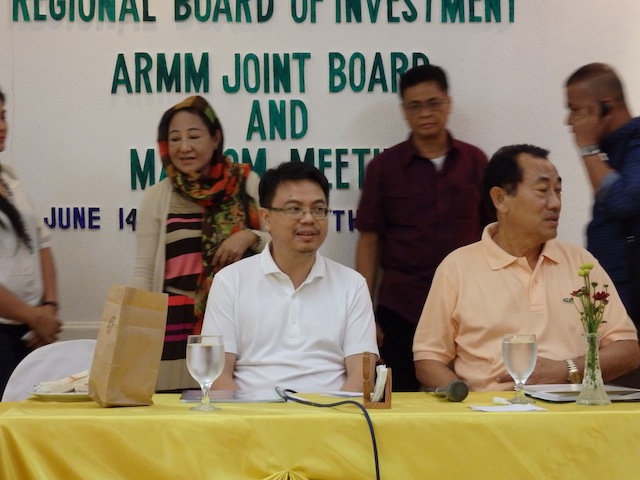DAVAO CITY (MindaNews / 15 June) — The Autonomous Region in Muslim Mindanao (ARMM) has set a new record in 24 years with P2.5 billion investments registered in the first six months of 2014, more than half of that in biomass energy projects, officials of the Regional Board of Investments (RBOI) said after their Joint Board and Management Committee meeting at the Apo View Hotel here Saturday afternoon.
Investments in the first half of 2014 are almost twice the P1.46 billion registered in 2013, with biomass renewable energy projects that would generate a total of 22.5 megawatts, topping the list.
RBOI-ARMM chief Ishak Mastura told MindaNews this is the first time in the history of the ARMM that investments have reached over P2 billion.
He attributed the increase to the positive climate brought about by the signing of the Comprehensive Agreement on the Bangsamoro (CAB) between the Philippine government and the Moro Islamic Liberation Front (MILF).
 FIRST TIME. For the first time in the 24-year old ARMM, investments have reached P2.5 billion from January to June 2014, RBOI-ARMM chief Ishak Mastura (in white polo), said shortly after their board and management committee meeting at the Apo View Hotel on Saturday, June 14. MindaNews photo by Carolyn O. Arguillas
FIRST TIME. For the first time in the 24-year old ARMM, investments have reached P2.5 billion from January to June 2014, RBOI-ARMM chief Ishak Mastura (in white polo), said shortly after their board and management committee meeting at the Apo View Hotel on Saturday, June 14. MindaNews photo by Carolyn O. Arguillas
“Investors view this peace agreement as a removal of the major risk of flare-up of violent political conflict and insurgency in the region. We are bullish that investments in ARMM will exceed 2-billion pesos this year for the first time as a result,” Mastura had earlier said in a press statement.
Investments started pouring in after the signing of the GPH-MILF Framework Agreement on the Bangsamoro (FAB) on October 15, 2012. Under the FAB, the parties agreed that the status quo was “unacceptable” and that they would set up a new autonomous political entity called the “Bangsamoro,” to replace the ARMM.
Mastura said a total of P1.5 billion investments were registered in 2011, this went down to P565 million in 2012 and rose to P1.45 B in 2013.
In the first quarter of 2014, RBOI-ARMM registered P1.45 billion investments. By May it rose to P1.62 billion and to P2.5 billion by June with the approval Saturday of two more biomass energy projects and the construction of five oil depots in Polloc Port in Parang, Maguindanao.
According to the RBOI-ARMM’ statistics, a total of 1,784 jobs would be generated from the projects of the seven firms that registered this year.
Three of the firms are into renewable energy projects, one is in importation and distribution of petroleum products, another is into import and export trading business, one is setting up an oil palm kernel crushing plant and another firm is into mining.
The biomass energy projects are Lamsan Power Corporation’s P921.56 million 15-megawatt (MW) in Sultan Kudarat, Maguindanao using rice hull, corn husks, cobs and other agricultural waste from its cornstarch plant; the P366.36 million 4.5 MW biomass energy project of Green Earth Enersource Corporation, a subsidiary of Agumil Phlippines, Inc.; and the P486.12 million 3-MW biomass energy project of the Philippine Trade Center, Inc.
Mastura said the 1,784 jobs generated by the seven firms may appear small but he said he is optimistic more jobs would be generated with the entry of biomass energy projects.
“Energy is the foundation for growth. The foundation for any enterprise is power,” he said.
The biomass energy projects, he explained, will also benefit the community because out of the total 22.5 MW that would be generated by the three firms, Lamsan Power will be selling 11.5 MW to the Mindanao Grid. Agumil and Philippine Trade Center Inc. also plan to sell their excess power to the Grid, he added.
Cotabato City and the neighboring towns in Maguindanao continue to suffer from daily rotational brownouts.
Engr. Jun Macalawan, Supervising Investments Specialist of the RBOI-ARMM said Lamsans’ 15 MW will be operational by 2017.
Also registered with the RBOI-ARMM are Power-Up Ventures, Inc. which has a P50-million project to construct five oil depots in Polloc in Parang, Maguindanao, with a total capacity of 5 million liters; Agumil Philippines, Inc.’s P170 M Oil Palm Kernel Crushing Plant in Buluan, Maguindanao; the P10-M ABSCOR Multi-Trading Company in Maluso, Basilan which is engaging in import and export trading business; and the SR Languyan Mining Corporation’s P520-M nickel ore mining project with a capacity of a million metric tons per year in Barangay Darussalam, Languyan, Tawi-tawi. (Carolyn O. Arguillas / MindaNews)
